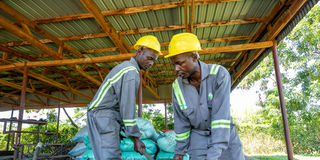Poo power: How Busia plant is turning human waste into organic fertiliser

Workers harvesting dry treated feacal sludge from vertical wetland beds.
What you need to know:
- So far, the plant has treated and transformed 997 tonnes of human waste in its first two years of operation.
- Although the co-compost is currently utilised solely on adjacent experimental farm, plans are underway to market and distribute the product commercially.
Upon arrival at the Busia County faecal sludge treatment and transformation plant (FSTP), we are greeted by rows of neatly arranged brown mounds of organic material sheltered beneath a wooden structure.
At first glance, they look like tonnes of rich gardening soil.
But these brown mounds are the final product of human waste treatment and transformation process undertaken at the plant. The initiative is the brainchild of Busia County government, Busia Water and Sewerage Services Company, local solid waste and faecal sludge collectors, Amref Health Africa and FINISH Mondial Kenya, a Dutch government-funded programme.
The faecal matter is collected from various sites including hotels, schools and households within Busia town and surrounding counties.
The faecal matter undergoes a series of treatment processes, passing through three specially designed vertical and horizontal-flow wetland systems that decontaminate and separate the liquid and solid components.
In the final phase, the treated waste is mixed with other organic municipal waste through a process known as co-composting. “We collect fruit and vegetables scraps from local markets and other garbage collection points twice a week and then process it together with the solid human waste. All this organic matter then decomposes, dries and matures over several months”, explains Charlotte Maua, who oversees the plant.
The final product, a nutrient-rich compost, serves as organic fertiliser.
According to Grace Okwisa from Amref Health Africa, there’s a global momentum for the circular sanitation economy.
“What is happening in Busia is emblematic of a broader trend that has been gaining traction in recent years. Transforming human waste into a valuable resource for the agricultural and energy sector is experiencing an unprecedented boom to the point that some dub it ‘a new multi-billion-dollar economic opportunity,” she tells Healthy Nation.
Pamela Bundi, head of the FINISH Mondial programme in Kenya, said: “Every day, vast amounts of human waste are carelessly dumped without giving a further thought to its potential. We have thought of faecal matter as a waste material for so long, and it’s quite a revolution to see it as a resource.”
Globally, it is estimated that human waste has the potential to provide 50 million tonnes of fertiliser, which would account for 25 per cent of the current global demand for fertilisers.
“Co-composting — the controlled aerobic degradation of the organics using more than one material (faecal sludge and organic municipal solid waste) — is a climate-smart technology and it contributes to greater food security. It has been proven to enhance soil nutrient and water retention, thereby improving soil fertility, without relying on harmful chemical fertilisers,” Ms Bundi adds.
There are other environmental benefits too. When human poo is not stored or collected properly, it emits methane and nitrous oxide, gases which are a major contributor to the climate crisis. “One major contributor of climate change is greenhouse gas emissions that emanate from inappropriately disposed waste and cause pollution. Production of co-compost that is generated from the FSTP has helped reduce this kind of pollution. Treatment processes have reduced the amount of GHGs such as carbon dioxide , methane and landfilled gas that would have been released into the environment from untreated waste, “MS Okwisa tells Healthy Nation, noting that faecal waste is a biohazard and, if inappropriately disposed of, it affects human health and well-being.
A recent meta-analysis of greenhouse gas emissions from non-sewered sanitation systems shows how damaging unsafe sanitation practices are to the environment.
So far, the Busia plant has treated and transformed 997 tonnes of human waste in its first two years of operation, according to data from the county government.
Although the co-compost is currently utilised solely on adjacent experimental farm, plans are underway to market and distribute the product commercially.
“The co-compost product has been tested twice in both long and short rainy seasons and applied on a variety of crops, with bounty harvest realised. Sensitisation is ongoing through site demonstrations, farmers' field schools, and exhibitions,” says Ms Mong’ina.
“We are currently in the final phases of the certification process and then the product will be in the market.”
Ms Bundi notes that FINISH Mondial plans to replicate the model of the plant in other regions of Kenya and beyond. “The Busia facility was designed with maximum cost-efficiency in mind, using readily available low-cost technologies, which makes the design highly replicable. In Kenya, we still have many non-sewered areas, which would particularly benefit from this type of collection and transformation of human waste,” she adds. In the meantime, the plant, in addition to its ongoing operational functions, will serve as a learning platform, showcasing its innovative model and hosting trainings for a diverse set of stakeholders.
It could also soon couple as a research centre, further enhancing its role in promoting and advancing the circular sanitation economy.
The head of the Dutch programme in the country says the final product at the plant is meant to augment adoption of climate-smart technologies. “ This translates to reduced use of chemical fertilisers, enhanced soil nutrient retention, improved water retention capacity and improved soil fertility. The nutrient content in manure will boost productivity and in the long run curb food insecurity,” she says.
Additionally, use of co compost manure protects crop vulnerability to pest and disease infestation.





